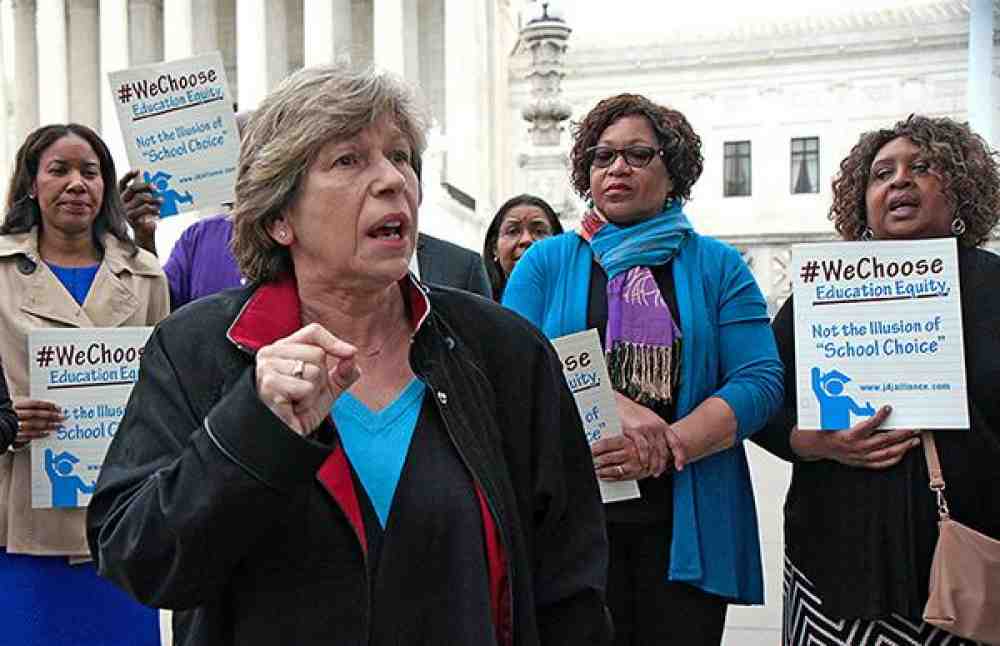A moral imperative, Ending poverty: Randi Weingarten President, American Federation of Teachers
June 11, 2018 - por Randi Weingarten/President, American Federation of Teachers

Randi Weingarten.
Fifty years since the launch of the Poor People’s Campaign by the Rev. Martin Luther King Jr., 43 million Americans(link is external) remain in the grips of poverty and 140 million Americans(link is external) are considered low-income. The number of families living on $2 per person, per day(link is external)—yes, $2 per day—has grown to 1.5 million American households, including 3 million children.
Think about that: Going years without seeing a dentist. Going to school in dirty clothes. Cleaning soiled diapers in order to reuse them. Selling plasma to buy food. Never having enough food.
I don’t know if President Trump thinks about that, in between his seemingly endless self-congratulatory tweets about his stewardship of the economy. It is true that the U.S. economy has generated immense wealth over the last half-century for those at the top of the economic ladder.
Against the backdrop of soaring economic inequality, a new campaign to protest policies that keep people in poverty has been revived. The new “Poor People’s Campaign: A National Call for Moral Revival(link is external)” was launched last week in state capitals and Washington, D.C., to demand federal and state living wage laws, investment and equity in education, protection of the right to vote, affordable high-quality healthcare and an end to mass incarceration.
The Rev. William Barber II(link is external), the founder of the Moral Mondays movement, has mapped a path to bring about this “moral revival” that includes policy demands, voter registration and civil disobedience.
While poverty disproportionately affects people of color(link is external), numerically, there are more white Americans in poverty(link is external) than any other race or ethnic group. The new Poor People’s Campaign builds on the Moral Mondays movement that mobilized across racial lines, finding the common ground of the disenfranchised. This is more important than ever, given the rising polarization in the age of Trump.
The United Nations recently conducted a report that revealed a bleak picture of the extreme poverty in the United States, documenting the terrible circumstances endured by the poor(link is external)—from unsafe sewage and sanitary conditions, to chronic homelessness, to criminalization and harassment just for being poor. The report(link is external) concluded that, particularly in a rich country like the United States, “the persistence of extreme poverty is a political choice made by those in power,” and that “with political will, it could be readily eliminated.”
Compare the political choices made by President Lyndon Johnson, whose War on Poverty enacted anti-poverty, health, education and employment policies and civil rights legislation, with the policies promoted by President Trump. Take the recent GOP tax bill, which is the biggest transfer of wealth to the rich in decades. The wealthiest 1 percent receives 83 percent(link is external) of the benefits. The tax plan will increase the deficit to nearly $1 trillion(link is external) in fiscal 2019, and the GOP is already using the skyrocketing deficit as an excuse to make deep cuts(link is external)to Social Security, Medicare, Medicaid, student aid, food and housing assistance, and other programs the neediest Americans depend on.
A recent AFT-Democracy Corps poll(link is external) found that most respondents have not benefited from the GOP tax plan. They are unhappy their wages are not keeping up with rising costs. They are angry that the GOP plans to pay for tax cuts by shredding the social safety net. And they feel strongly that the funds being redistributed to the rich should have been invested in public schools, healthcare or infrastructure.
Similarly, the Monmouth University Polling Institute found that only 12 percent of Americans feel they have benefited a lot from the recent economic upturn(link is external), while a majority say they are still struggling. Yet a majority (57 percent) of people understand that the wealthiest families have benefited from Trump’s policies.
At the launch of the new Poor People’s Campaign, a low-wage domestic worker spoke of suffering depression and suicidal thoughts over her fears that, despite her hard work, she and her children would end up homeless. “Systemic poverty has been created(link is external),” she said through tears, “not because we’re lazy or don’t want to work, but because of politicians who block a living wage.”
Lack of investment in public education, including low wages, are at the core of the teacher walkouts(link is external) that have rippled across America. The inequity between the haves and have-nots hurts kids every day. Last week, the Journey for Justice Alliance released “Failing Brown v. Board(link is external),” an analysis of course offerings at high schools in 12 cities. It shows that students attending majority-black and/or -brown schools are still segregated by inequitable education because their schools offer fewer academic subjects and less of the arts than majority-white schools.
AFT members address the plight of poverty every day in their work in hospitals and schools, and we are proud to be a coalition partner in the new Poor People’s Campaign. In this age of unprecedented bounty, it is time to end the oppression of the poor and embrace a moral revival. That would make America great.
